新概念第二册 lesson 23 精美课件(共35张PPT)
文档属性
| 名称 | 新概念第二册 lesson 23 精美课件(共35张PPT) | 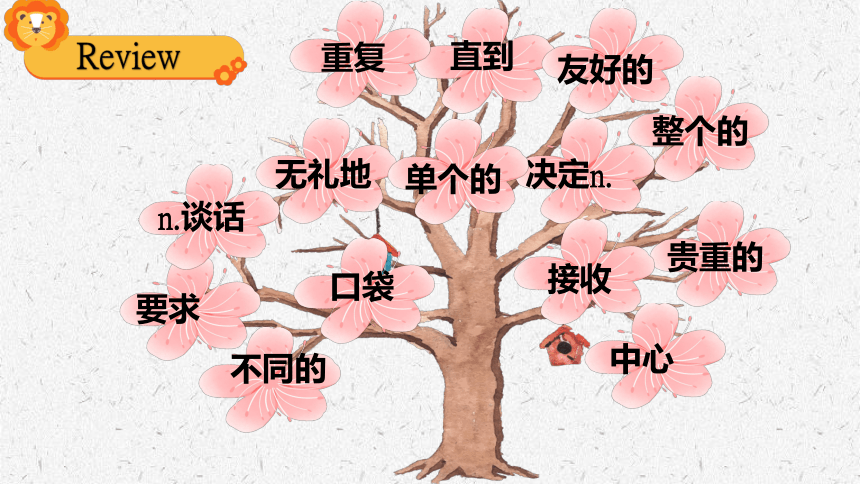 | |
| 格式 | zip | ||
| 文件大小 | 11.0MB | ||
| 资源类型 | 试卷 | ||
| 版本资源 | 新概念英语 | ||
| 科目 | 英语 | ||
| 更新时间 | 2021-11-29 18:16:59 | ||
图片预览

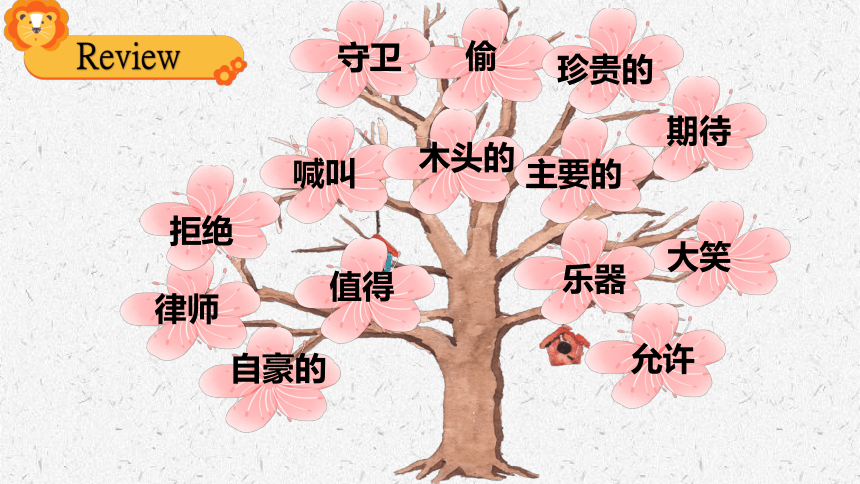
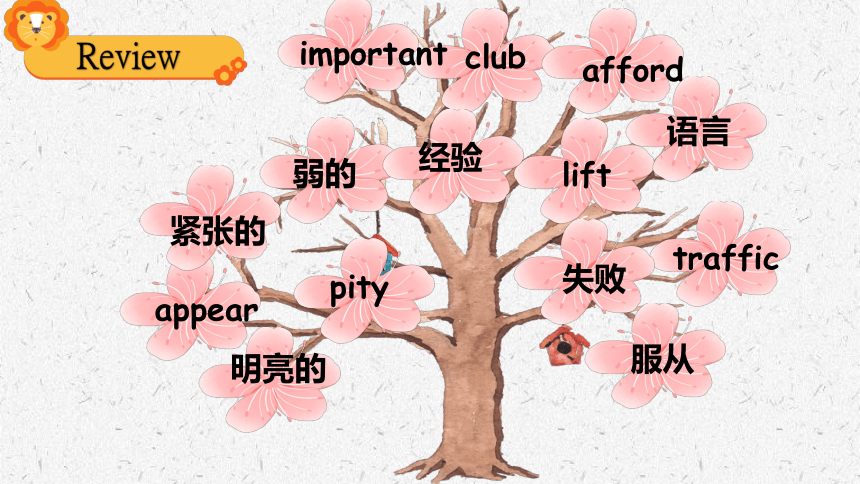
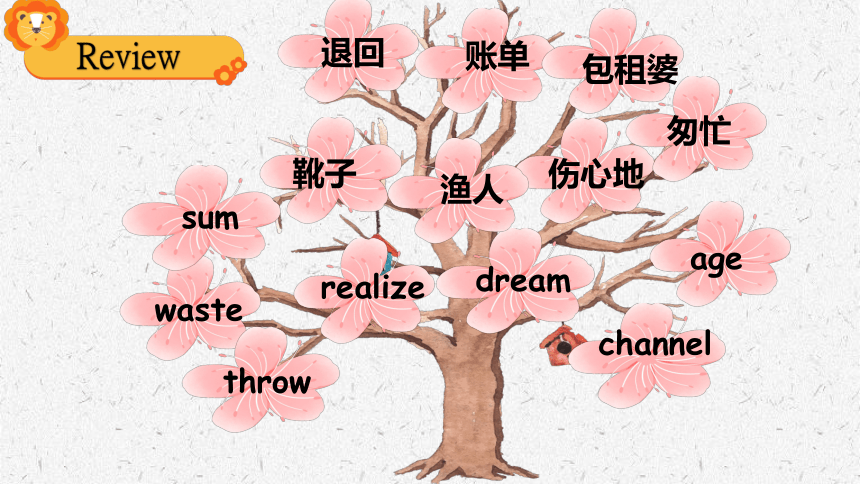





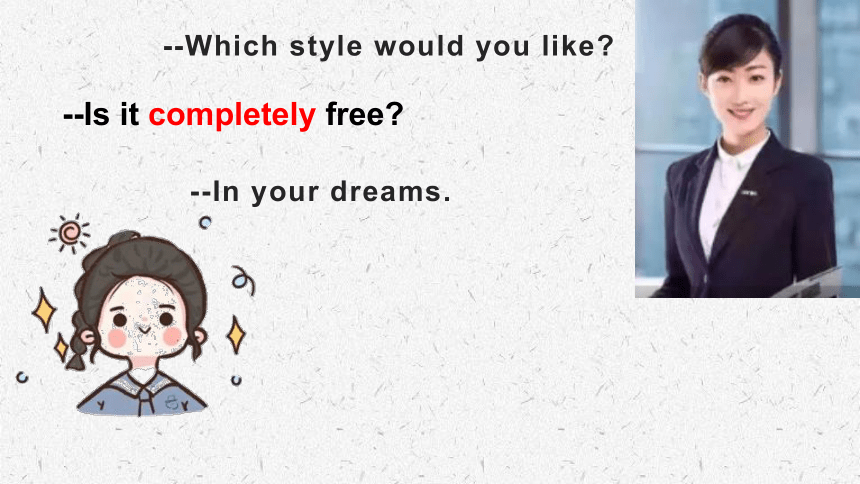
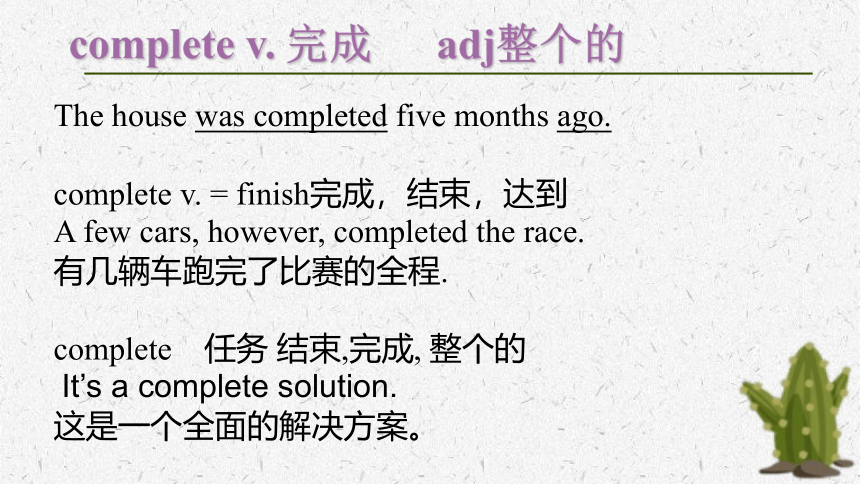

文档简介
(共35张PPT)
Review
直到
无礼地
重复
决定n.
要求
整个的
贵重的
接收
中心
n.谈话
不同的
友好的
单个的
口袋
Review
偷
喊叫
守卫
主要的
律师
期待
大笑
乐器
允许
拒绝
自豪的
珍贵的
木头的
值得
Review
club
弱的
important
lift
appear
语言
traffic
失败
服从
紧张的
明亮的
afford
经验
pity
Review
账单
靴子
退回
伤心地
waste
匆忙
age
dream
channel
sum
throw
包租婆
渔人
realize
Lesson 23
A New House
If you’re a house agent, what house do you want to introduce to us
traditonal American style
modern American style
traditonal Chinese style
modern Chinese style
traditonal European style
modern European style
--Which style would you like
--Is it completely free
--In your dreams.
complete v. 完成 adj整个的
The house was completed five months ago.
complete v. = finish完成,结束,达到
A few cars, however, completed the race.
有几辆车跑完了比赛的全程.
complete 任务 结束,完成, 整个的
It’s a complete solution.
这是一个全面的解决方案。
strange a.奇怪的
It is a very modern house, so it looks strange to some people.
This is strange! 太奇怪了!
stranger 陌生人
modern a. 现代的;时髦的
a modern house 现代化的房子
modern art 现代艺术
modern age 现代
modern style 现代风格
a modern lady
However, 现在的年轻人已经很少用modern
a modern lady
trendy
fashionable
chic
in
Hanfu / Han-style clothing is trendy among the young.
district 地区; 区域; 区; 行政区;
I drove around the business district.
我开车在商业区转了转。
area 是这组词中用得最广的,表示的“地区”可大可小,但通常不指行政分区。如:I find the people in this area very friendly. 我发现这个 地方的人很友好。
近义词区分
district 通常指一个国家或城市的行政分区,有时也指非行政分区。如:
The busiest shopping district in Beijing is around Wangfujing Street.
Chaoyang Disctrict is one of the busiest district in Beijing.
Let’s read.
complete
modern
strange
district
Review
奇怪的
district
realize
complete
区域
语言
现代的
exclaim
服从
strange
完成
modern
经验
pity
Reading comprehension
1.What did the writer’s sister say in her letter
She would come to England next year.
2.When did the work on the house begin
Five months ago.
3. Why is the house special
It’s a modern house and it looks strange to some people.
I had a letter from my sister yesterday.
She lives in Nigeria. In her letter, she said that she would
come to England next year.
have a letter from
=receive a letter from
尼日利亚是非洲第一人口大国,总人口2.01亿
Nigeria
If she comes, she will get a surprise.
We are now living in a beautiful new house in the country.
surprise n.
使人惊奇的,意外的事物
Work on it had begun before my sister left.
The house was completed five months ago.
work 不可数名词
工作,活
it 代指house
In my letter, I told her that she could stay with us.
The house has many large rooms and there is a lovely
garden.
stay :短期停留
暂住
there be 有
It is a very modern house, so it looks strange to
some people.
It must be the only modern house in the district.
look smell seem
feel taste sound
感官动词 + adj. 作表语
the only 唯一
ii. Phrases and sentences.
1. 收到某人来信
2. 来自我姐姐的信
3. 明年
4. 一栋漂亮的新房子
5.五个月前
6. 感到惊奇
7.看起来奇怪
8.肯定是
9.和我们呆在一起
receive one’s letter
a letter from my sister
next year
a beautiful new house
five months ago
feel surprised / get a surprise
look strange
must be
stay with us
Grammar
将来进行时&
条件状语从句--if引导的主将从现
Make sentences:
1.明天他们会去看电影。
2.明天这会儿他们将会去看电影。
3.如果明天不下雨,他们就去看电影。
They will go to the movies tomorrow.
They will be going to the movies tomorrow.
If it doesn’t rain tomorrow, they will go to the movies.
一般将来时: will + v.原形
We’ll see his boat and then we’ll say goodbye th him.
将来进行时: will be + v.ing
Tomrrow evening they will be singing at the Workers’ Club.
if 引导的条件句:will 主将从现
If you park your car in the wrong place, a traffic policeman will soon find it.
位置:从句可放在主句之前或之后,但是放在主句之前须有逗号隔开
eg:如果我有足够的钱,我就去环游世界
If 引导条件状语从句
定义:if “如果, 假如” 它引导的句子表示某事发生所需的条件,即“在…条件下,某事才能发生”,在句子中充当状语,因此称之为条件状语从句。( If引导的条件状语从句表示假如有从句的动作发生,就会有主句动作的发生 )
If I have enough money, I will travel around the world .
=I will travel around the world if I have enough money.
条件状语从句
条件状语从句
1. 如果主句是一般将来时,从句则用一般现在时。
If it rains(从句), I will stay at home.
I’ll go with you if you don’t want to go alone(从句).
2.如果主句含有must, may, can 等情态动词,从句也要用
一般现在时。
If you drive too fast, you may have an accident.
You must stop if the traffic is red.
If you finish the homework, you can go home.
如果你作业做完了就可以回家了。
If you want to lose weight you must/should eat less bread.
如果你想减肥,你必须少吃面包。
条件状语从句
3. 如果主句是祈使句,从句同样要用一般现在时。
Don’t go and play football if you don’t finish your homework.
Please call me if he comes next Sunday.
主将从现、主情从现、主祈从现
1.If he____________ (not, do it ), I___________(do) it.
2.If you ____ (be) late for school ,my teacher ________(be) angry.
are
will be
3 If she________ (win) the prize ,we _______(be) happy.
wins
will be
4.If I _________ (not,eat )so much ,I _________(get) thinner.
5.If you ______(tell) them, they _____________ (not,believe) you.
don’t eat
will get
tell
won’t believe
6. I _________(stay) at home,If it __________( rain).
7.If it ____________(not,rain) ,I _________( go) out.
8. we __________(play) football, If it is _________(sun) .
9.If she __________(become) a star ,her parents ____________ (not,send) her away
will stay
rains
doesn’t rain
will go
will play
sunny
becomes
won’t send
doesn’t do
will do
条件状语从句
If 在宾语从句中翻译为“是否”
If 在条件状语从句中翻译为“如果”
I’ll go to see you if I am free next week.
I want to know if he is a teacher.
whether
1. if 在句中的含义不同
条件状语从句
summary
if的用法
2.引导条件状语从句:译为“如果,假如”
(1) if从句+祈使句
(2) if从句+主句(一般将来时)
(3) if从句+主句(含有情态动词)
1.引导宾语从句:译为“是否”,表示不确定的概念。
I don’t know if your father can come together .
Can you tell me if miss your parents
条件状语从句
Thank you!
Review
直到
无礼地
重复
决定n.
要求
整个的
贵重的
接收
中心
n.谈话
不同的
友好的
单个的
口袋
Review
偷
喊叫
守卫
主要的
律师
期待
大笑
乐器
允许
拒绝
自豪的
珍贵的
木头的
值得
Review
club
弱的
important
lift
appear
语言
traffic
失败
服从
紧张的
明亮的
afford
经验
pity
Review
账单
靴子
退回
伤心地
waste
匆忙
age
dream
channel
sum
throw
包租婆
渔人
realize
Lesson 23
A New House
If you’re a house agent, what house do you want to introduce to us
traditonal American style
modern American style
traditonal Chinese style
modern Chinese style
traditonal European style
modern European style
--Which style would you like
--Is it completely free
--In your dreams.
complete v. 完成 adj整个的
The house was completed five months ago.
complete v. = finish完成,结束,达到
A few cars, however, completed the race.
有几辆车跑完了比赛的全程.
complete 任务 结束,完成, 整个的
It’s a complete solution.
这是一个全面的解决方案。
strange a.奇怪的
It is a very modern house, so it looks strange to some people.
This is strange! 太奇怪了!
stranger 陌生人
modern a. 现代的;时髦的
a modern house 现代化的房子
modern art 现代艺术
modern age 现代
modern style 现代风格
a modern lady
However, 现在的年轻人已经很少用modern
a modern lady
trendy
fashionable
chic
in
Hanfu / Han-style clothing is trendy among the young.
district 地区; 区域; 区; 行政区;
I drove around the business district.
我开车在商业区转了转。
area 是这组词中用得最广的,表示的“地区”可大可小,但通常不指行政分区。如:I find the people in this area very friendly. 我发现这个 地方的人很友好。
近义词区分
district 通常指一个国家或城市的行政分区,有时也指非行政分区。如:
The busiest shopping district in Beijing is around Wangfujing Street.
Chaoyang Disctrict is one of the busiest district in Beijing.
Let’s read.
complete
modern
strange
district
Review
奇怪的
district
realize
complete
区域
语言
现代的
exclaim
服从
strange
完成
modern
经验
pity
Reading comprehension
1.What did the writer’s sister say in her letter
She would come to England next year.
2.When did the work on the house begin
Five months ago.
3. Why is the house special
It’s a modern house and it looks strange to some people.
I had a letter from my sister yesterday.
She lives in Nigeria. In her letter, she said that she would
come to England next year.
have a letter from
=receive a letter from
尼日利亚是非洲第一人口大国,总人口2.01亿
Nigeria
If she comes, she will get a surprise.
We are now living in a beautiful new house in the country.
surprise n.
使人惊奇的,意外的事物
Work on it had begun before my sister left.
The house was completed five months ago.
work 不可数名词
工作,活
it 代指house
In my letter, I told her that she could stay with us.
The house has many large rooms and there is a lovely
garden.
stay :短期停留
暂住
there be 有
It is a very modern house, so it looks strange to
some people.
It must be the only modern house in the district.
look smell seem
feel taste sound
感官动词 + adj. 作表语
the only 唯一
ii. Phrases and sentences.
1. 收到某人来信
2. 来自我姐姐的信
3. 明年
4. 一栋漂亮的新房子
5.五个月前
6. 感到惊奇
7.看起来奇怪
8.肯定是
9.和我们呆在一起
receive one’s letter
a letter from my sister
next year
a beautiful new house
five months ago
feel surprised / get a surprise
look strange
must be
stay with us
Grammar
将来进行时&
条件状语从句--if引导的主将从现
Make sentences:
1.明天他们会去看电影。
2.明天这会儿他们将会去看电影。
3.如果明天不下雨,他们就去看电影。
They will go to the movies tomorrow.
They will be going to the movies tomorrow.
If it doesn’t rain tomorrow, they will go to the movies.
一般将来时: will + v.原形
We’ll see his boat and then we’ll say goodbye th him.
将来进行时: will be + v.ing
Tomrrow evening they will be singing at the Workers’ Club.
if 引导的条件句:will 主将从现
If you park your car in the wrong place, a traffic policeman will soon find it.
位置:从句可放在主句之前或之后,但是放在主句之前须有逗号隔开
eg:如果我有足够的钱,我就去环游世界
If 引导条件状语从句
定义:if “如果, 假如” 它引导的句子表示某事发生所需的条件,即“在…条件下,某事才能发生”,在句子中充当状语,因此称之为条件状语从句。( If引导的条件状语从句表示假如有从句的动作发生,就会有主句动作的发生 )
If I have enough money, I will travel around the world .
=I will travel around the world if I have enough money.
条件状语从句
条件状语从句
1. 如果主句是一般将来时,从句则用一般现在时。
If it rains(从句), I will stay at home.
I’ll go with you if you don’t want to go alone(从句).
2.如果主句含有must, may, can 等情态动词,从句也要用
一般现在时。
If you drive too fast, you may have an accident.
You must stop if the traffic is red.
If you finish the homework, you can go home.
如果你作业做完了就可以回家了。
If you want to lose weight you must/should eat less bread.
如果你想减肥,你必须少吃面包。
条件状语从句
3. 如果主句是祈使句,从句同样要用一般现在时。
Don’t go and play football if you don’t finish your homework.
Please call me if he comes next Sunday.
主将从现、主情从现、主祈从现
1.If he____________ (not, do it ), I___________(do) it.
2.If you ____ (be) late for school ,my teacher ________(be) angry.
are
will be
3 If she________ (win) the prize ,we _______(be) happy.
wins
will be
4.If I _________ (not,eat )so much ,I _________(get) thinner.
5.If you ______(tell) them, they _____________ (not,believe) you.
don’t eat
will get
tell
won’t believe
6. I _________(stay) at home,If it __________( rain).
7.If it ____________(not,rain) ,I _________( go) out.
8. we __________(play) football, If it is _________(sun) .
9.If she __________(become) a star ,her parents ____________ (not,send) her away
will stay
rains
doesn’t rain
will go
will play
sunny
becomes
won’t send
doesn’t do
will do
条件状语从句
If 在宾语从句中翻译为“是否”
If 在条件状语从句中翻译为“如果”
I’ll go to see you if I am free next week.
I want to know if he is a teacher.
whether
1. if 在句中的含义不同
条件状语从句
summary
if的用法
2.引导条件状语从句:译为“如果,假如”
(1) if从句+祈使句
(2) if从句+主句(一般将来时)
(3) if从句+主句(含有情态动词)
1.引导宾语从句:译为“是否”,表示不确定的概念。
I don’t know if your father can come together .
Can you tell me if miss your parents
条件状语从句
Thank you!
同课章节目录
